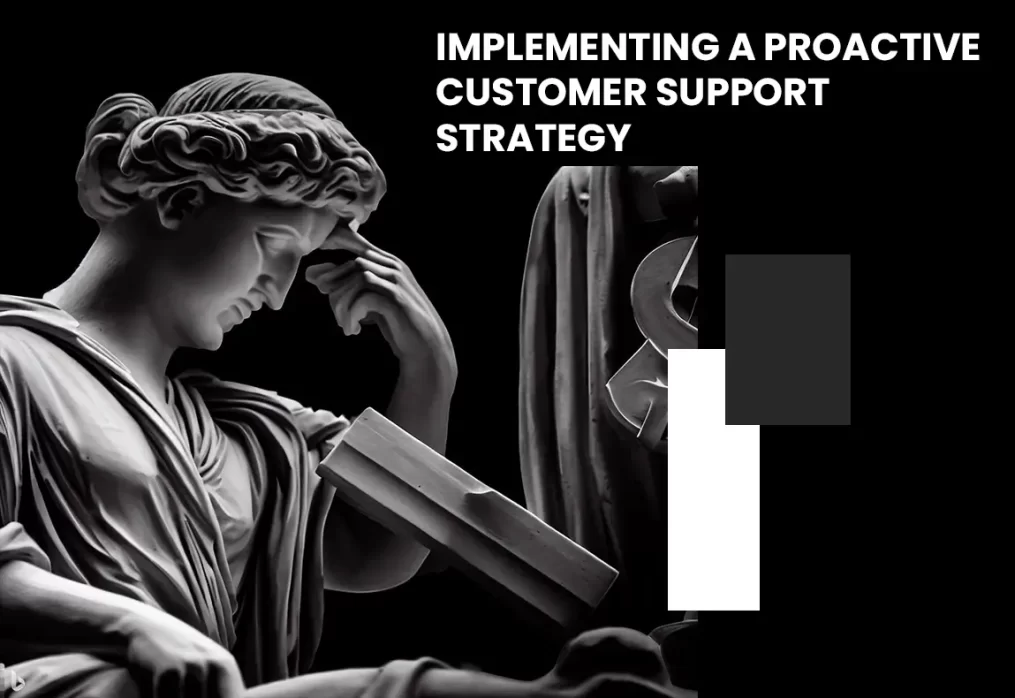Implementing a Proactive Customer Support Strategy: Strategies for businesses to shift from reactive to proactive customer support approaches, focusing on anticipating customer needs and delivering exceptional experiences
Implementing a proactive customer support strategy is essential for businesses aiming to enhance customer satisfaction and loyalty. Moving away from reactive approaches, proactive strategies prioritize anticipating customer needs and providing exceptional experiences. By actively monitoring customer behavior and preferences, companies can tailor their offerings and address potential issues before they arise. This shift enables personalized interactions, timely assistance, and proactive communication, fostering more robust customer relationships and elevating the overall customer experience. A proactivestrategy anticipates needs, delivers exceptional experiences, and fosters stronger relationships, providing a competitive advantage in the market.
Embracing a proactive approach is vital to staying ahead in today’s competitive marketplace.
The Importance of Proactive Customer Support
Proactive customer support is of paramount importance in today’s competitive business landscape. Here are five key points highlighting its significance:
Anticipating Customer Needs
By adopting a proactive approach, businesses can deeply understand customer preferences, pain points, and expectations. This knowledge allows them to anticipate customer needs before explicitly expressing them, enhancing the overall customer experience.2.
Enhancing Customer Satisfaction
Proactive support empowers businesses to address potential issues before they become customer problems. By actively monitoring customer behavior and analyzing data, companies can identify and resolve issues proactively, leading to higher customer satisfaction and loyalty.
Building Customer Trust
When customers experience proactive support, they perceive the company as attentive, caring, and invested in their success. This builds trust and the relationship between the customer and the business, fostering long-term loyalty.
Differentiating from Competitors
In a crowded marketplace, offering proactive customer support sets a business apart from its primarily reactive competitors. By providing personalized and tailored experiences, companies can create a unique value proposition that attracts and retains customers.
Driving Business Growth
Proactive customer support improves customer satisfaction and leads to positive word-of-mouth referrals and repeat business. Satisfied customers are likelier to become advocates, promoting the business to others and contributing to its growth.
Shifting from Reactive to Proactive Approaches
Adopting reactive to proactive approaches is fundamental in implementing a proactive custome strategy. Instead of waiting for customer issues to arise, businesses proactively anticipate customer needs and deliver exceptional experiences. This shift involves actively monitoring customer behavior, analyzing data, and leveraging insights to identify potential pain points before they become problems. By proactively addressing customer needs, businesses can exceed expectations, build trust, and foster long-term loyalty. Embracing a proactive approach empowers companies to stay one step ahead, provide personalized solutions, and create a customer-centric culture that sets them apart from competitors.
Anticipating Customer Needs: Data Analysis and Insights
Anticipating customer needs through data analysis, and insights is crucial to implementing a proactive customer support strategy. Here are three key points highlighting its significance:
Data-driven Decision Making
Businesses can gain valuable insights into customer behavior and patterns by leveraging customer data. Analyzing this data allows them to identify trends, anticipate needs, and proactively address potential issues.
Predictive Analytics
Utilizing predictive analytics techniques, businesses can forecast customer needs and behavior based on historical data. This enables them to take preemptive actions, such as offering relevant recommendations or resolving potential problems before they occur.
Personalized Experiences
Anticipating customer needs empowers businesses to provide personalized experiences. Companies can enhance customer satisfaction and loyalty by understanding individual preferences and proactively tailoring their offerings, fostering a solid competitive advantage.
Delivering Exceptional Experiences: Personalization and Tailored Solutions
Delivering exceptional experiences through personalization and tailored solutions is a cornerstone of a proactive customer support strategy. Businesses can customize their offerings, recommendations, and interactions by understanding customer preferences. This level of personalization enhances the customer experience, making it more relevant and meaningful. Tailored solutions address specific needs and pain points, going beyond generic support. By going the extra mile to provide exceptional experiences, Businesses can leave a lasting positive impression, foster customer loyalty, and differentiate themselves in the market.
Proactive Communication Channels and Strategies
Proactive communication channels and strategies are vital to a proactive customer support strategy. Here are five key points that highlight their significance:
- Multi-channel Approach: Utilizing various communication channels such as email, phone, live chat, social media, and self-service portals enables businesses to reach customers on their preferred platforms, ensuring prompt and proactive communication.
- Automated Notifications: Implementing automated notifications and alerts keeps customers informed about order status, product updates, or relevant information. Proactively sharing updates reduces uncertainty and enhances the overall customer experience.
- Proactive Outreach: Initiating communication with customers before they reach out with an issue demonstrates attentiveness. For example, sending personalized follow-up emails after a purchase or conducting proactive check-ins can address potential concerns and showcase a commitment to customer satisfaction.
- Surveys and Feedback: Proactively seeking customer feedback through surveys and feedback forms provides valuable insights. This information helps identify areas for improvement and enables businesses to address issues before they escalate.
- Knowledge Base and FAQs: Proactively sharing comprehensive knowledge bases and frequently asked questions (FAQs) empowers customers to find answers to common queries independently. This reduces the need for direct support and encourages self-service, freeing resources for more complex inquiries.
Strengthening Customer Relationships through Proactive Support
Strengthening customer relationships through proactive support is crucial to a proactive customer strategy. Businesses can build trust and loyalty by anticipating customer needs, addressing concerns proactively, and providing personalized assistance. Regular communication, follow-ups, and personalized recommendations demonstrate a genuine commitment to customer success. By going above and beyond reactive support, businesses can foster long-term relationships, cultivate brand advocates, and create a positive reputation that sets them apart from competitors. Strong customer relationships are the foundation for sustainable business growth and customer loyalty.
Measuring Success: Key Metrics and Feedback Loops
Measuring success through critical metrics and feedback loops is essential when shifting from reactive to proactive customer support. By monitoring metrics like customer satisfaction scores, response times, and resolution rates, businesses can gauge the effectiveness of their proactive approach. Feedback loops, such as customer surveys and feedback forms, provide valuable insights into customers’ experiences and expectations. These measurements enable businesses to continuously improve their strategies for anticipating customer needs and delivering exceptional experiences. By analyzing data, identifying areas for improvement, and iterating on their proactive support efforts, businesses can ensure they meet and exceed customer expectations, ultimately driving customer satisfaction and loyalty.
Concluding statement
In conclusion, implementing a proactive customer support strategy is crucial for businesses aiming to excel in today’s customer-centric landscape. By shifting from reactive to proactive approaches and prioritizing the anticipation of customer needs, companies can deliver exceptional experiences and foster stronger customer relationships. Through personalized interactions, timely assistance, and proactive communication, businesses can gain a competitive advantage, build trust, and drive customer loyalty. By embracing proactive support, companies can be leaders in providing exceptional customer experiences.


